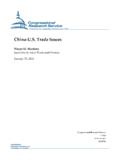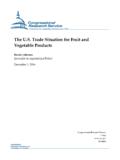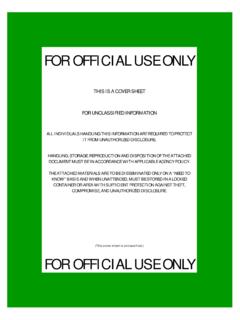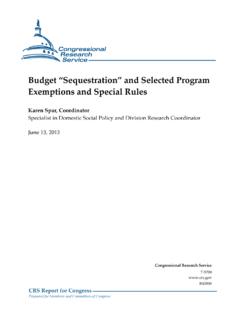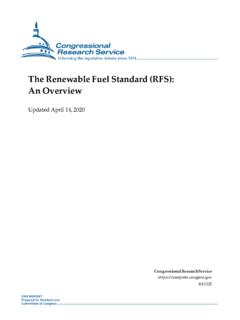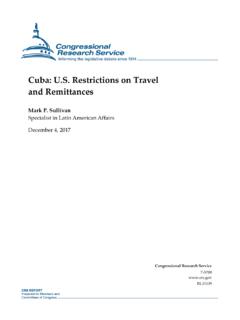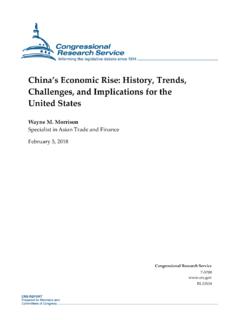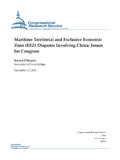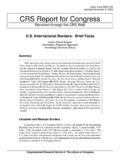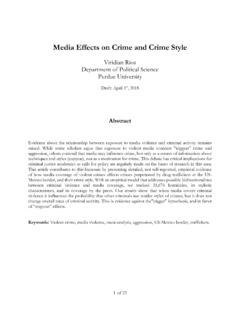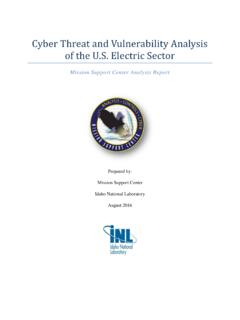Transcription of Defining Homeland Security: Analysis and Congressional ...
1 CRS Report for CongressPrepared for Members and Committees of Congress Defining Homeland security : Analysis and Congressional Considerations Shawn Reese Analyst in Emergency Management and Homeland security Policy January 8, 2013 Congressional Research Service 7-5700 R42462 Defining Homeland security : Analysis and Congressional Considerations Congressional Research Service Summary Ten years after the September 11, 2001, terrorist attacks , the government does not have a single definition for Homeland security . Currently, different strategic documents and mission statements offer varying missions that are derived from different Homeland security definitions.
2 Historically, the strategic documents framing national Homeland security policy have included national strategies produced by the White House and documents developed by the Department of Homeland security (DHS). Prior to the 2010 National security Strategy, the 2002 and 2007 National Strategies for Homeland security were the guiding documents produced by the White House. In 2011, the White House issued the National Strategy for Counterterrorism. In conjunction with these White House strategies, DHS has developed a series of evolving strategic documents based on the two national Homeland security strategies and include the 2008 Strategic Plan One Team, One Mission, Securing the Homeland ; the 2010 Quadrennial Homeland security Review and Bottom-Up Review; and the 2012 Department of Homeland security Strategic Plan.
3 The 2012 DHS strategic plan is the latest evolution in DHS s process of Defining its mission, goals, and responsibilities. This plan, however, only addresses the department s Homeland security purview and is not a document that addresses Homeland security missions and responsibilities that are shared across the federal government. Currently, the Department of Homeland security is developing the 2014 Quadrennial Homeland security Review, which is due late 2013 or early 2014. Varied Homeland security definitions and missions may impede the development of a coherent national Homeland security strategy, and may hamper the effectiveness of Congressional oversight.
4 Definitions and missions are part of strategy development. Policymakers develop strategy by identifying national interests, prioritizing goals to achieve those national interests, and arraying instruments of national power to achieve the national interests. Developing an effective Homeland security strategy, however, may be complicated if the key concept of Homeland security is not defined and its missions are not aligned and synchronized among different federal entities with Homeland security responsibilities. This report discusses the evolution of national and DHS-specific Homeland security strategic documents and their Homeland security definitions and missions, and analyzes the policy question of how varied Homeland security definitions and missions may affect the development of national Homeland security strategy.
5 This report, however, does not examine DHS implementation of strategy. Defining Homeland security : Analysis and Congressional Considerations Congressional Research Service Contents Introduction and Issue .. 1 Evolution of the Homeland security Concept .. 1 Evolution of Homeland security Strategic Documents .. 2 Effects on Congressional 3 Definitions and Missions as Part of Strategy Development .. 3 Evolution of the Homeland security Definitions and Missions .. 3 2002 2009 Strategic Document Evolution .. 4 2010 Present Document Evolution .. 5 Federal Homeland security Mission Activities and Funding.
6 5 Definitions .. 8 Missions .. 10 Analysis and Considerations .. 13 Ta b l e s Table 1. FY2012 Appropriations and FY2013 Request for Homeland security Mission Funding by Agency .. 6 Table 2. Summary of Homeland security Definitions .. 8 Table 3. Summary of Homeland security Missions and Goals .. 11 Contacts Author Contact 15 Defining Homeland security : Analysis and Congressional Considerations Congressional Research Service 1 Introduction and Issue Ten years after the 9/11 terrorist attacks , policymakers continue to grapple with the definition of Homeland security .
7 Prior to 9/11, the United States addressed crises through the separate prisms of national defense, law enforcement, and emergency management. 9/11 prompted a strategic process that included a debate over and the development of Homeland security policy. Today, this debate and development has resulted in numerous federal entities with Homeland security responsibilities. For example, there are 30 federal entities that receive annual Homeland security funding excluding the Department of Homeland security (DHS). The Office of Management and Budget (OMB) estimates that 48% of annual Homeland security funding is appropriated to these federal entities, with the Department of Defense (DOD) receiving approximately 26% of total federal Homeland security funding.
8 DHS receives approximately 52%.1 Congress and policymakers are responsible for funding Homeland security priorities. These priorities need to exist, to be clear and cogent, in order for funding to be most effective. Presently, Homeland security is not funded on clearly defined priorities. In an ideal scenario, there would be a clear definition of Homeland security , and a consensus about it; as well as prioritized missions, goals, and activities. Policymakers could then use a process to incorporate feedback and respond to new facts and situations as they develop.
9 This report examines how varied, and evolving, Homeland security definitions and strategic missions may affect the prioritization of national Homeland security policy and how it may affect the funding of Homeland security . To address this issue, this report first discusses and analyzes examples of strategic documents, their differing Homeland security definitions, and their varying Homeland security missions. Evolution of the Homeland security Concept The concept of Homeland security has evolved over the last decade. Homeland security as a concept was precipitated by the terrorist attacks of 9/11.
10 However, prior to 9/11 such entities as the Gilmore Commission2 and the United States Commission on National Security3 discussed the need to evolve the way national security policy was conceptualized due to the end of the Cold War and the rise of radicalized terrorism. After 9/11, policymakers concluded that a new approach was needed to address the large-scale terrorist attacks . A presidential council and department were established, and a series of presidential directives were issued in the name of Homeland security . These developments established that Homeland security was a distinct, but undefined Later, the federal, state, and local government responses to disasters such as Hurricane Katrina expanded the concept of Homeland security to include significant disasters, major public health emergencies, and other events that threaten the United States, its economy, the rule of law, 1 Office of Management and Budget, Budget of the United States Government, Fiscal Year 2013.
